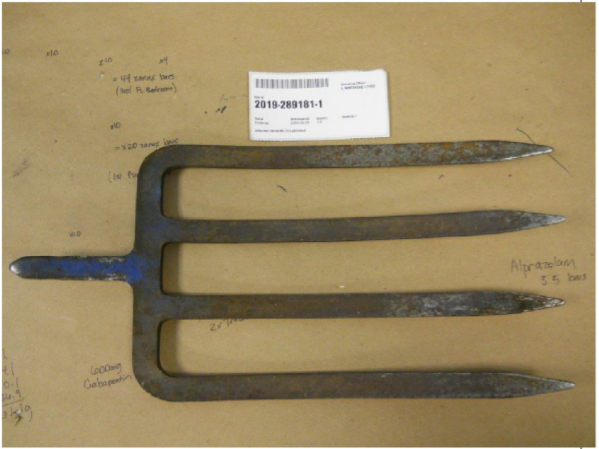
An alarming Aug. 5 broad daylight pitchfork attack on a Seattle street, allegedly committed by a man who had been out of jail only four days, appears to be kindling outrage among conservatives who are fed up with the city’s tolerance of “drug criminals” and other offenders.
KIRO midday broadcaster Dori Monson wrote at MyNorthwest.com, “The most violent drug criminals are moving here from out of the state. Our public officials try to deny that and give us the impression that these people are the kids we grew up with, who have just fallen on hard times. It’s just not true.”
According to KIRO Eyewitness News, the local CBS affiliate, the suspect in this attack is 28-year-old Daniel Aaron Kuchta, a man with a history of violent crime. He has been charged with second-degree assault, and Monson is wondering why he hasn’t been charged with attempted murder.
Seattle’s KOMO, the local ABC affiliate, reported that in 2009 Kutcha was charged in Oregon with attempted murder as a juvenile. KIRO said his current address was listed in a Seattle Police Department report as “a homeless shelter in Pioneer Square.”
Earlier this year, he was arrested for misdemeanor assault and obstruction, and released on his own recognizance. He failed to appear in court, a warrant was issued and in July he was arrested and subsequently pleaded guilty to a single count of fourth-degree assault. He received a 364-day suspended sentence on Aug. 1 and was released from the Pierce County Jail the same day. Four days later he was in Seattle, allegedly attacking the woman with a pitchfork.
Published reports say Kutcha told police he had injected methamphetamine shortly before the attack in Seattle’s Ballard district. Two men working nearby rushed to help the victim and captured Kutcha, holding him until police arrived. Kutcha is now in the King County Jail on $150,000 bail. The suspect was apparently trying to steal the woman’s purse, but she used it as a shield against the pitchfork.
Seattle is famous as a magnet for what some people call “the professional homeless.” The current city government has been promoting the creation of “safe injection sites” for drug users.
Meanwhile, the city is also known among Second Amendment activists for its anti-gun-rights attitudes. Voters in the city strongly supported two gun control initiatives, one in 2014 and the other in 2018, that dramatically restricted gun rights in the state. But those measures do not appear to have had much if any genuine impact on violent crime.
The first, Initiative 594, mandates so-called “universal background checks” for nearly all firearm transfers. The second, Initiative 1639, raised the minimum age for purchasing a semiautomatic rifle, and created a definition of such a weapon—which Spokane County Sheriff Ozzie Knezovich famously said earlier this year does not really exist—that applies to every self-loading rifle, centerfire or rimfire, that has ever been manufactured.
There are no background checks for pitchforks.
However, in King County, which encompasses Seattle, there are more than 100,000 active concealed pistol licenses. That’s approximately one of every six active CPLs in the state.
Ten years ago, Seattle under then-Mayor Greg Nickels, attempted to ban firearms in city park facilities in violation of Washington’s long-standing state preemption law. The city was sued by the Second Amendment Foundation, National Rifle Association, Citizens Committee for the Right to Keep and Bear Arms, Washington Arms Collectors and several individual citizens. The ban was struck down by the King County Superior Court, and that ruling was unanimously upheld by the state Court of Appeals.
The city adopted a “gun violence tax” on the sale of firearms and ammunition within city limits. Proponents predicted the tax would raise between $300,000 and $500,000. Instead, one of the city’s two major gun stores relocated to a different county, taking customers and revenue with it. The other retailer now directs its firearms customers to its other store, in a different county. Revenue from the tax has consistently declined, from just over $103,000 the first year, to $77,518 in 2018. The liberal state Supreme Court upheld the tax.
In his commentary, KIRO’s Monson raised a question for Seattle officials and provided an answer:
“Why wouldn’t they try to lock this meth-head away for years? It’s because there’s no political will to do so. They would much rather figure out the quickest and easiest way to release this guy, put him back on the streets, and then express their shock and disappointment when he kills someone the next time. Our mayor, city council, and prosecutor continue to let our streets get taken over by the drug vagrants in this revolving door of justice.”
Second Amendment activists also believe that Seattle officials would figure out a way to blame it all on guns.